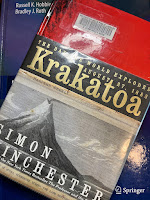Can there be even louder sounds? Yes, there can! This new homework problem lets you calculate the loudest possible sound.
Section 13.4
Problem 17 ½. Let us calculate the loudest possible sound in air.
(a) Use Eq. 13.29 to calculate the intensity of a sound in W m−2, using 428 Pa s m−1 for the acoustic impedance of air and one atmosphere (1.01 × 105 Pa) for the pressure. This pressure is the largest that can exist for a sinusoidally varying sound wave, as an even louder sound would create a minimum pressure below zero (less than a vacuum).
(b) Use the result from part (a) to calculate the intensity in decibels using Eq. 13.34.For those of you who don’t have a copy of IPMB at your side, here are the two equations you need
I = ½ p2/Z (13.29)
Intensity level = 10 log10(I/I0) (13.34)
where I is the intensity, Z is the acoustic impedance, p is the pressure, I0 is the minimum perceptible intensity (10−12 W m−2), and log10 is the common logarithm.
I’ll let you do the calculation, but you should find that the loudest sound is about 191 dB. Is this really an upper limit? No, you could have a peak pressure larger than one atmosphere, but in that case you wouldn’t be dealing with a traditional sound wave (with pressure ranging symmetrically above and below the ambient pressure) but more of a nonlinear acoustic shock wave.
 |
| Krakatoa, by Simon Winchester. |
Simon Winchester tells this story in his fascinating book Krakatoa: The Day the World Exploded, August 27. 1883. Krakatoa is an island that is now part of Indonesia. When it erupted, people on the island of Rodriguez in the western Indian Ocean, nearly 3000 miles from Krakatoa, could hear it. Winchester writes
In August 1883 the chief of police on Rodriguez was a man named James Wallis, and in his official report… for the month he noted:Winchester concludesOn Sunday the 26th the weather was stormy, with heavy rain and squalls; the wind was from SE, blowing with a force of 7 to 10, Beaufort scale. Several times during the night (26th–27th) reports were heard coming from the eastward, like the distant roar of heavy guns. These reports continued at intervals of between three and four hours, until 3 pm on the 27th, and the last two were heard in the directions of Oyster Bay and Port Mathurie [sic].This was not the roar of heavy guns, however. It was the sound of Krakatoa—busily destroying itself fully 2,968 miles away to the east. By hearing it that night and day, and by noting it down as any good public servant should, Chief Wallis was unknowingly making for himself two quite separate entries in the record books of the future. For Rodriguez Island was the place furthest from Krakatoa where its eruptions could be clearly heard. And the 2,968-mile span that separates Krakatoa and Rodriguez remains to this day the most prodigious distance recorded between the place where unamplified and electrically unenhanced natural sound was heard and the place where that same sound originated.
The sound that was generated by the explosion of Krakatoa was enormous, almost certainly the greatest sound ever experienced by man on the face of the earth. No manmade explosion, certainly, can begin to rival the sound of Krakatoa—not even those made at the height of the Cold War’s atomic testing years.
No one knows how many decibels Krakatoa’s eruption caused on the island itself. The sound was almost certainly in the nonlinear regime, and probably had an intensity of over 200 dB.
An Interview with Simon Winchester.
https://www.youtube.com/watch?v=MGNLJb1m2fg



No comments:
Post a Comment